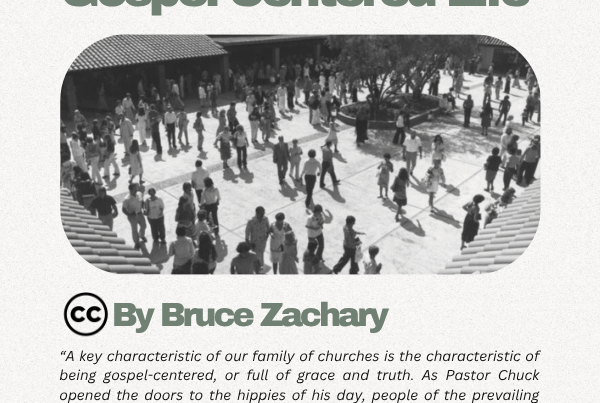
One of the joys of parenthood is taking your kids to the park. I’ve always enjoyed watching children interact with each other and those they don’t know. There’s so much of human nature that can be learned, not to mention cultural differences. Now that my kids are mostly grown, those park days seem a ways off in the rearview mirror, this is until recently: my wife and I were met by a young boy hearing us speak English, and he looked us straight in the eyes and mimicked English-speaking gibberish sounds. Then, he smiled and trotted off to play with his friends. I was impressed by his ability to imitate what he heard, but it also got me thinking about the difference between mimicking and imitating.
In 1 Corinthians 11:1, Paul wrote, “Be imitators of me, as I am of Christ.” He was speaking about his ethical life within the church, having liberty and restraining himself for the benefit of others. He also talked about his spiritual life, as he refused idols but fought the good fight to bring blessing and order to the church. Imitating Paul was not a call to mimic him, which is more of an unconscious act, but to imitate, meaning thoughtful observation put into action with intentionality.
The difference between mimicking and imitating can seem thin. Mimicking is often used negatively, like kids mimicking another’s annoying habits by grossly exaggerating them to get a laugh. Imitating, at least the way Paul uses it, can mean copying or emulating, but reflection and action are at the heart of these words.
When it comes to imitating, we must know what to emulate. Mimicking, however, is a little more natural. The Corinthians mimicked or reflected their culture by dividing into factions, eating meat sacrificed to idols, or allowing disorder in the worship service. Even if Paul needed to correct some in ministry leading the disorders, chances are it wasn’t premeditated. They probably never considered the problems in such depth before Paul wrote to them. This is the power of the Word of God; it can take us out of our culture to see our behavior from His perspective. This allows transformation if we couple this with belief put into action.
My apologetics professor introduced us to a Christian philosopher who speaks about what he called the “mimetic desire”: René Girard. Girard developed his ideas in the U.S. after leaving France in the late 1950s. He spoke of how people grow and learn from birth through imitating others. This is vital to the sociability of children, who grow up to be like their parents and those around them who influenced them. As adults, the desire to belong is to conform to a culture, movement, or family that moves along seamlessly. There’s then built within our hearts, a need to fit in. This is a way of describing the “mimetic desire,” but what seems so natural that it goes unnoticed also has some downsides, notably in crises.[1]
Within the framework of fitting in, there inevitably comes a moment when natural flow doesn’t work. Soon, the crisis moment is amplified by conflict, and emotions intensify. That’s when, through the “mimetic desire,” we try to look for culprits or scapegoats. The one not following could be easily confused with the deeper problem. We find someone annoying enough, someone who blew it, or simply someone who is out of step with the rest … They become the focus of the problem, marginalized and eliminated. One of Girard’s examples is Marie Antoinette, a foreigner who was singled out to alleviate the malaise of the French Revolution. She wasn’t a criminal and wasn’t exceptionally evil or any more immoral than anyone else. Still, her foreign accent and Austrian royal customs came to embody all that was wrong with the nation in the eyes of the starving people.[2]
This is the danger of the “mimetic desire.” We aren’t imitating but herding or being herded against people created in the image of God. Once we find the person, movement, or group that seems to be causing our problems, we can isolate them and make them pay for the whole. When it’s done, we can be lulled into breathing easily again because we believe we’ve purged the situation. But what if the person, in their diversity, was a gift to help us see outside our cultural bias?
Girard’s ideas aren’t to be confused with crime and punishment. As a Christian, he’d put that in an altogether different category. This concerns society and culture. If we don’t allow differing voices, we can create a monotone culture of people who look, think, act, and speak alike. This is mimetism, which can undermine the Spirit’s natural way of adding diversity to the Church.
Mimicking and scapegoating will never purge the problem, even if it may release tension in a crisis moment. The problem always comes back — maybe not in the same form. Perhaps a problem was solved, but lasting relief is not possible on this side of Heaven. The problem is still humanity — it is within us — we are sinners!
When we see this mimicking happening in a group, and especially one that’s morphing into a type of prejudice-fueled scapegoating, we should be aware. One of the first things that helps us see it in others is that we are deeply entrenched in our own group. It’s the Marie Antoinette reaction. This is the time to stop. If we operate only within the bounds of our said group, we will only reason within their sphere of logic. Then, we can only cry out the slogans of our tribe, which, though they make perfect sense to us, will only be met with the slogans from the opposing group. There is only one escape—the gospel. I’m challenged by Frank Thielman’s statement, “Our efforts to limit the outreach of the gospel and the fellowship of believers to people like us and people with whom we are comfortable may show we do not actually understand the gospel.”[3] This is a terrible reality because it goes against our natural mimetic desire to want to fit in and be surrounded by familiar people.
This is where the beauty of the gospel can come to our rescue. We don’t need to look for a scapegoat; we have the Lamb of God who takes away the sin of the world[4] to purge the source of crisis. Jesus became sin so that we become righteous for God.[5] Thus, he is the victor because he defeated the problem. The gospel helps us overcome the difficulties of mimetic desire. Because Jesus was singled out as the outsider, though as Creator, He is the ultimate insider, He takes our scapegoating tendencies and transforms them through His being the sacrificial Lamb. No more scapegoats are needed because a Lamb paid the price! In this way, we can imitate Paul thoughtfully and actively, just as Paul imitated Christ, whose letters, through the power of God, still draw us out of our cultural bias to see the One who has made everything right.
Footnotes
[1] Joe Carter wrote this helpful article in 2012, explaining the “mimetic desire” using Christopher Nolan’s “The Dark Knight” series: https://www.thegospelcoalition.org/article/why-batman-doesnt-know-jesus/
[2] René Girard, Le Bouc Émmissaire. Éditeur Bernard Grasset. Paris, 33-34.
[3] Frank Thielman, Galatians. ESV Expository Commentary. (Wheaton, Illinois: Crossway, 2018), 597.
[4] John 1:29
[5] 2 Corinthians 5:21










